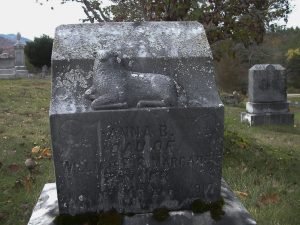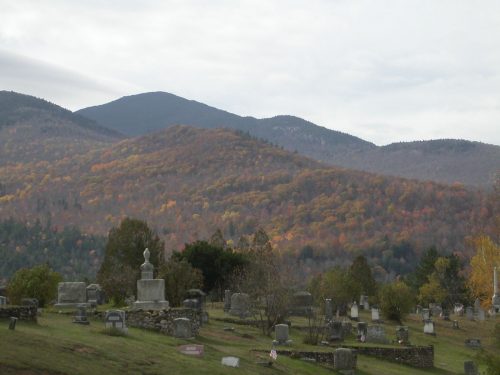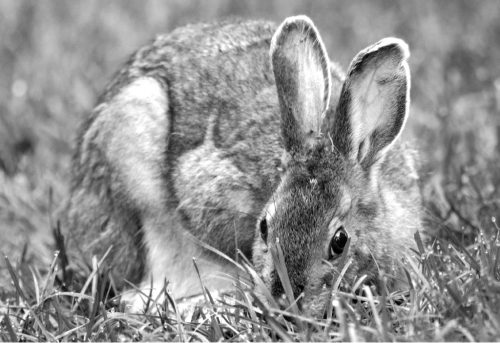To you and yours.
What you lose at Samhain always comes back to you.


I stopped by this cemetery in the middle of a busy day to take gothic photographs for my Samhain blogpost. Unexpectedly, I ran across the graves of two friends of mine, David and Paula McDonough. He died in 2013 and she died this past year. I didn’t know they were buried in this cemetery. They owned the hardware store in my village and I saw them often, usually at the store but sometimes other places. The store recently sold, which felt wrong, even though they could hardly run it while they were dead.

My relationship with death is usually rather detached, especially in cemeteries. I visit this cemetery several times a year, at night or in the early evening, to watch the sky with other amateur astronomers. I pass it on the road regularly. The place is pretty, but familiar and even banal. I’ve decided this is where I want to be buried, so already it feels a little like home.

I can’t say what I was feeling today was grief, exactly, because we’re told grief is so many things. It is anger and guilt and sadness and apathy. It is trying to remember and trying to forget. What I felt today was a wishing that would not abate in intensity for being told it could not be satisfied. I disliked knowing that things never stay the same. Losing David was bearable while Paula was still around. She confided she didn’t care much for the store, but kept it going in his memory.

I stayed in the cemetery a long time, waiting for the feeling of emptiness and loss to pass, but it never did. Eventually a crow flew close to me and cawed loudly, and I left.
Here is an excerpt from the sixth tablet of the Epic of Gilgamesh, recorded in the second millenium, B.C.E.:
Do we build a house forever?
Do we seal a contract for all time?
Do brothers divide shares forever?
Does hostility last forever between enemies?
Does the river forever rise higher, bringing on floods?. . . . . . . .
From the beginning there is no permanence.

I must be the only person in my village who takes a broom to the front porch to tear down the spider webs on Halloween. I like the holiday, including the trick-or-treating, but for me it’s not about terror.

Trick-or-treating comes from an old custom of children dressing in rags to signify the poor departed souls who cannot find their way to the Otherworld. Householders would give the children treats to bless and mollify the spirits of the unhappy departed, reducing the chances that they would do troublesome things like emit strange knocking sounds or whisk things around in the wind. This was one aspect of the Celtic holiday, which was about remembering ancestors.
I sometimes wonder how mainline Christians would feel about Easter becoming a festival of terror and evil. After all, Jesus rises from the dead, so that’s a more plausible holiday for a zombie apocalypse. Keeping the spirit of the spirit of Halloween can be a challenge, because I certainly don’t want to be one of those Halloween Scrooges who turn off the lights and pretend they’re not home.
I’m looking forward to tonight. I do like seeing all the children. I get lots and lots of trick-or-treaters, so many that I wonder if some of the teenagers dare each other to come to my house on Halloween. But hey–this witch tore down the spider webs in front of the door.

Several years ago, I ran over a rabbit in the car on a lonely stretch of highway. I don’t remember what kind of rabbit; it wasn’t important at the time, probably not even to the rabbit. What mattered was that the rabbit was alive, and then it was dead.
As is typical of deserted roads in the Adirondacks, it was several miles before I could find a place to turn around, but I felt it was important to return, to take responsibility for my action, inadvertent as it was, and honor the life taken. When I returned I discovered the rabbit had hopped or been thrown to the side of the pavement, where it died. I was struck not with pity or regret or self-recrimination, but with confusion and then with wonder. Because the rabbit was not there. The body lay beside the road but the rabbit was gone gone gone. The rabbit had hopped away, with no attachment to the physical form or the place of death. Perhaps I could call its spirit back and ask forgiveness, but why do that, except to placate my own spirit? It happened. The rabbit had moved on. I needed to do the same.
I tend to think that the ease with which the rabbit slipped out the world had to do with the temporal nature of cornerstone species, their short lives making their foothold in this world a tentative one. I imagine that the long-lived elephant would leave with a long good-bye, especially from what I have read about elephant funerals and elephant graveyards. Then too, our North American leporidae are not social creatures, unlike elephants and Old World rabbits. A social hierarchy seems to anchor a species to the earth, creating as it does a more complex system of obligation.
Given the rabbit’s ease in slipping into the world of the dead, it is interesting that graveyards provide such a hospitable living environment for rabbits, hosting open grassy spaces in metropolitan or densely forested areas. While we usually think of bats and spiders at Halloween, the rabbit seems like a highly appropriate animal to meditate upon as the veil grows thin.
In my book, Invoking Animal Magic, I devote a whole chapter to folklore about rabbits and hares.

Halloween will be upon us soon and this object fits the mood. This is a replica of a dagger found in an early gravesite in Poland. This was a gift from my friend Sonya and I do not have a date. Death Goddesses in Eastern Europe were not typically the voluptuous “Venus” figures but were more often thin and depicted in rigid posture.

It’s been a frustrating week in foreign language study. For some reason, Samhain has been on patrol a bit more than usual, enforcing the household English-only policy.
This policy was instituted by the cat. She yowls whenever I review my Munsee vocabulary. A Siamese can yell louder than any person, so this is a ban she can enforce. She has an Irish name and her ancestors immigrated from Thailand, but she won’t tolerate any spoken word other than English. Today I thought she was taking a nap, so I opened my language materials, and then she walked in and I thought “Oh no.” Then I said (in English) “This is ridiculous.”
The cat I had before used to start crying when Spanish was spoken in the house, and since we were living in Tucson at the time it couldn’t always be avoided. Don’t tell me animals can’t understand what we’re saying, because they go berserk when they think we’re talking in code. When I was a teenager we had a poodle who was unusually smart, and we actually had to start spelling certain words instead of saying them, because if he got wind that we were up to something he wanted included in, he would begin campaigning strongly to go along. Eventually he became suspicious whenever we started spelling. Nobody likes being left out.
Munsee is actually not a foreign language but one of the Native Algonquian languages, so Samhain is not only a fascist but a colonialist. Starting today, I am going to push back against this reign of tyranny I find myself living under.
No reviews either. I’m getting ready to submit the manuscript for my next book so I’m a bit distracted from blogs and blogging. I’ll let my cat Samhain handle the post this week. This picture was taken right after she threw my pen on the floor. Part of an international cat conspiracy to infiltrate the homes of writers and decrease the output of literature. Cats do not like books.